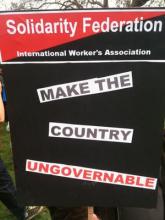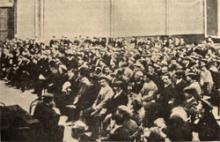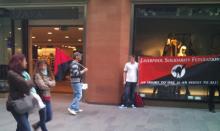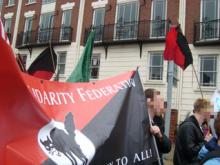Class war on the streets of London
On March 26th, London saw people assemble to protest and take direct action against the government. Most of the people there were marching quite simply because their jobs, their services, and their livelihoods are under attack. This included those of us in anarchist blocs, though we also argued for a much broader perspective and recognition that capitalism itself was the issue, not just the current "ConDem cuts."
Arriving in London, members of the Liverpool Solidarity Federation headed to Kennington Park. We met up with other SolFed members, as well as members of the Anarchist Federation and other class struggle anarchists to form the Radical Workers Bloc on the South London feeder march.




